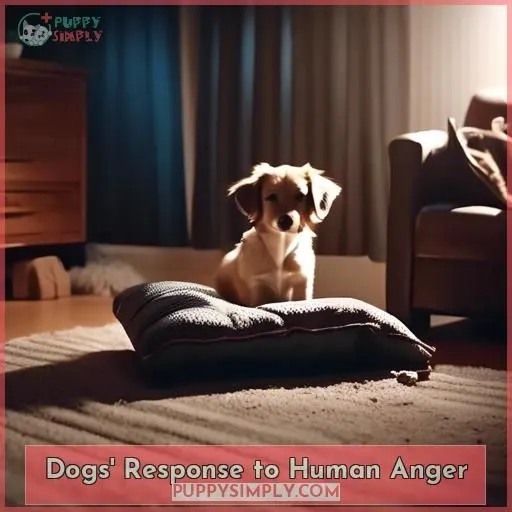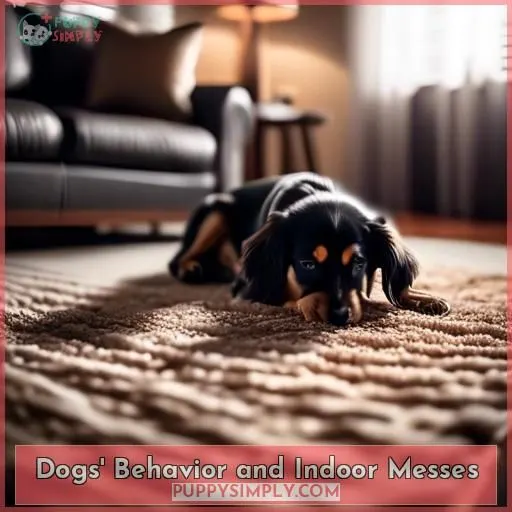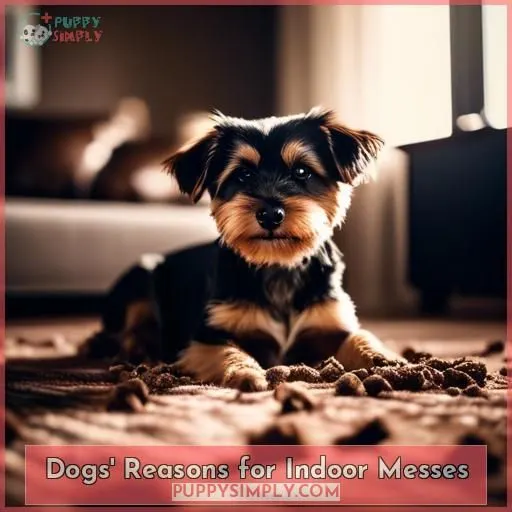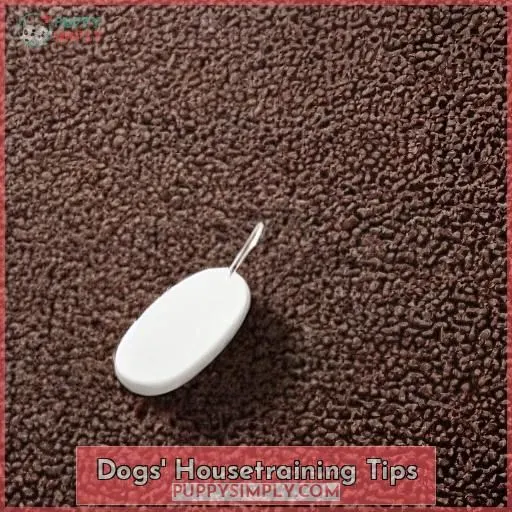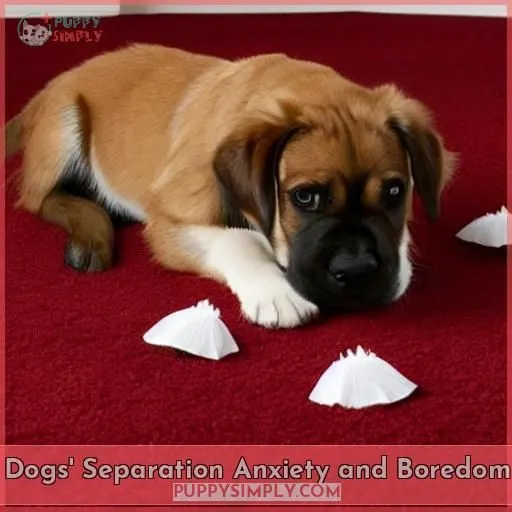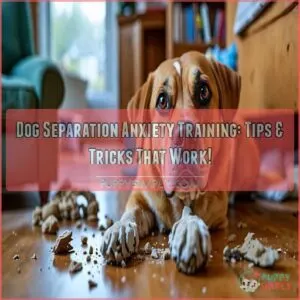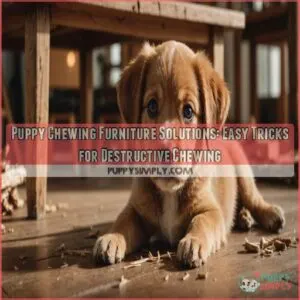This site is supported by our readers. We may earn a commission, at no cost to you, if you purchase through links.
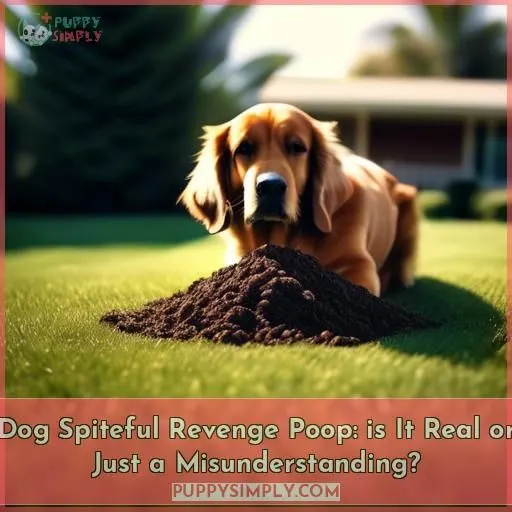
You might think your dog’s guilty look after an indoor mess indicates spiteful revenge, but that’s a misunderstanding.
Dogs don’t experience complex emotions like guilt or vengeful motives.
Their submissive behavior when you’re upset results from anxiety, not vengeful intent.
Dogs poop indoors due to anxiety, lack of training, or excess energy – not as a reprisal.
Though it tugs at your heartstrings, indoor messes stem from an inability to comprehend human emotions, not a rebellious moral compass.
To grasp the real reasons behind this behavior, we must dive deeper into canine psychology.
Table Of Contents
Key Takeaways
- Dogs do not experience complex emotions like guilt or vengeful motives; indoor messes are more likely due to anxiety, lack of training, or excess energy.
- The guilty look often interpreted as an admission of guilt by dog owners is actually a submissive response to human emotions, not a sign of the dog’s inner moral compass.
- Positive reinforcement and consistent routines are crucial in housetraining dogs, as they do not understand human language or logic and respond better to rewards for good behavior.
- Separation anxiety and boredom can lead to destructive behaviors such as indoor elimination; providing mental, physical, and social stimulation can help prevent these issues.
Dogs’ Guilty Look: a Misinterpretation
When your dog flashes that guilty look, you might think they’re admitting to indoor indiscretions. But hold your horses! This look isn’t a canine confession; it’s more about their response to your emotions. Dogs are sharp at picking up human emotions, and that sheepish expression is their way of saying, Let’s keep the peace! It’s a submissive response, not an admission of guilt.
From your dog’s perspective, the world is a smorgasbord of smells, and they’re not wired to understand your distaste for indoor elimination. So, when you come home to a mess and your dog looks like they’re attending their own pity party, remember it’s their reaction to your upset vibes, not a sign of their inner moral compass going haywire.
This misinterpretation can tug at the heartstrings, but it’s essential to maintain that dog-human bond. Instead of getting riled up, consider if anxiety or separation anxiety is at play. After all, your furry friend’s theory of mind doesn’t include a chapter on human potty preferences.
Dogs’ Understanding of Guilt
Do Dogs Understand Guilt?
Dogs don’t feel guilt as humans do. Instead, they react to human emotions and respond with submissive behaviors. The guilty look isn’t a sign of guilt but a fearful response to human anger. Dogs may appear guilty when they’re scolded, even if they didn’t commit the misdeed. This submissive behavior is a learned response to human reactions, not an indication of guilt or shame.
Dogs’ Response to Human Anger
Dogs don’t pee or poo indoors out of revenge. They may not understand that humans find these actions unacceptable in the house.
Instead, dogs may mess indoors due to anxiety, boredom, or excess physical energy. Dogs can recognize human emotions like anger, but they don’t necessarily associate their actions with the human’s anger.
The guilty look a dog may exhibit is a submissive response to human anger, not a sign of guilt for the actual mess. Dogs may cower when confronted with anger or raised voices, and this behavior is often referred to as submissive behavior.
Dogs may also exhibit submissive behaviors like rolling onto their belly, averting their gaze, or holding their ears back when they feel uncertain or fearful. Dogs can tell the difference between happy and angry human faces, which may be why they react differently to different human emotions.
Dogs’ Behavior and Indoor Messes
As a conscientious pet owner, you may have contemplated if your dog is intentionally creating a mess indoors as a form of reprisal. The resolution is negative. Dogs lack the capacity to comprehend human emotions or purposes. They don’t associate their actions with the humans’ ire. Instead, they may mess indoors due to nervousness, ennui, or excess physical energy.
Dogs are motivated by their olfactory communication, elimination customs, and territorial marking. They may defecate indoors as a token to their owners, as a means to mark their territory, or as an indication of submissive behavior. House training is indispensable in pet care, and it involves feeding the dog in areas where they tend to mess, taking them for lengthy walks and playtime at the dog park, providing ample mental, physical, and social stimulation, and abstaining from penalty for indoor messes.
It is imperative to recognize that dogs don’t comprehend human language or logic. They necessitate patience and positive reinforcement to learn and enhance their behavior. Frustration and anger won’t assist the dog in learning or improving behavior. Instead, it may impair the bond between the dog and human.
Dogs’ Reasons for Indoor Messes
You may have heard that dogs poop or pee inside as an act of revenge or spite against their owners. However, this is a common misconception. Dogs don’t possess the cognitive ability to comprehend complex emotions like resentment or to deliberately plan acts of retaliation.
Dogs Reasons for Indoor Messes
Dogs may mess indoors due to anxiety, boredom, or excess physical energy.
Anxiety can cause dogs to feel the need to eliminate indoors, especially when they’re left alone.
Boredom can lead dogs to seek out attention or stimulation by eliminating in the house.
Excess physical energy can result in dogs not being able to hold their elimination, leading to accidents indoors.
Housetraining Tips
After debunking the myth of spiteful revenge pooping, let’s delve into housetraining.
It’s not rocket science, but it does require a blend of mental stimulation, positive reinforcement, and consistent routines as steady as a metronome.
If your furry Einstein still turns your rug into a no-go zone, a veterinary consultation might reveal an underlying issue.
Understanding Dog Behavior
Understanding your dog’s behavior is essential for addressing indoor messes.
Dogs do not pee or poo indoors out of revenge, but rather due to anxiety, boredom, or excess energy.
They do not associate their actions with human anger, but may exhibit a guilty look as a submissive response.
Dogs communicate through scent marking, which is a form of territorial marking and social hierarchy.
Providing mental, physical, and social stimulation can help prevent indoor messes.
Dogs’ Housetraining Tips
Positive reinforcement is a powerful tool in dog training, particularly in the context of housetraining. This method involves rewarding your dog for good behavior, such as eliminating outside, to encourage them to repeat that behavior in the future. Here are some tips on how to use positive reinforcement effectively:
- Reward the desired behavior: Every time your dog eliminates outside, give them lots of praise and treats or let them go for some playtime. This will help them associate good things happening when they relieve themselves outside.
- Be patient and consistent: Training takes time, so be patient and consistent with your rewards. If you’re consistent, your dog will learn that good things happen when they eliminate outside while nothing happens when they go indoors.
- Offer mental, physical, and social stimulation: Boredom is a major factor in common behavior problems, so keep your dog mentally, physically, and socially stimulated. Training sessions can provide a variety of stimuli that your dog will enjoy.
- Keep it fun: Make training sessions enjoyable for both you and your dog. Keep them short and upbeat, and your dog will view training as playtime rather than a chore.
Dogs’ Separation Anxiety and Boredom
Your furry friend’s indoor messes mightn’t be a result of revenge but rather a sign of separation anxiety or boredom. Dogs are social creatures that crave companionship and stimulation. When left alone for extended periods, they may become anxious and resort to destructive behaviors like messing indoors.
To combat separation anxiety, provide your dog with toys and a comfortable space. Regular walks and playtime at the dog park can also help reduce anxiety and provide much-needed physical and mental stimulation. Training sessions can also be beneficial, as they offer attention and positive reinforcement.
Boredom is another common cause of indoor messes. Dogs need mental, physical, and social stimulation to stay happy and healthy. Providing a variety of toys, engaging in interactive play, and ensuring regular exercise can help alleviate boredom.
Incorporating these strategies into your dog’s routine can help reduce indoor messes and improve their overall well-being. Remember, understanding your dog’s needs and providing them with the right environment and stimulation is key to a happy and healthy pet.
Frequently Asked Questions (FAQs)
How can I prevent my dog from pooping indoors?
You gotta ditch the idea that it’s revenge—pups just don’t think that way. Make sure proper potty training, ample exercise, and engaging activities to keep ’em content indoors. Consistency and patience are key to curbing those indoor messes.
Why does my dog exhibit the guilty look even when not responsible?
Imagine your pup just wolfed down your favorite shoes, but when you get home, they greet you with those big, oops, I messed up eyes. That’s the guilty look – their way of saying my bad even if they didn’t actually do anything wrong.
Can dogs understand human emotions like anger?
You bet! Dogs can definitely recognize human emotions like anger or happiness. Though they may not fully grasp the subtleties behind our feelings, they’re experts at reading our body language and vocal cues. So be mindful when disciplining – your furry pal picks up on more than you think!
What are the common causes of poor potty habits in dogs?
You got it! Poor potty habits often stem from anxiety, boredom, or too much pent-up energy. Like kids, dogs need plenty of exercise and mental stimulation to stay on their best behavior. A bored pup is a destructive pup, am I right?
How can I manage my dog’s revenge poop behavior?
You got it, buddy! Ditch the revenge poop drama by giving your furry pal plenty of potty breaks, playtime, and TLC. If that doesn’t work, don’t be a hero – call in the dog whisperer for some professional help.
Conclusion
Beating around the bush, let’s cut to the chase: dogs don’t engage in spiteful revenge poop.
Their indoor messes stem from anxiety, lack of training, or excess energy, not vengeful motives.
By understanding canine psychology and addressing the real reasons behind their behavior through proper housetraining and enrichment, you can prevent future accidents and strengthen your bond with your furry friend.



